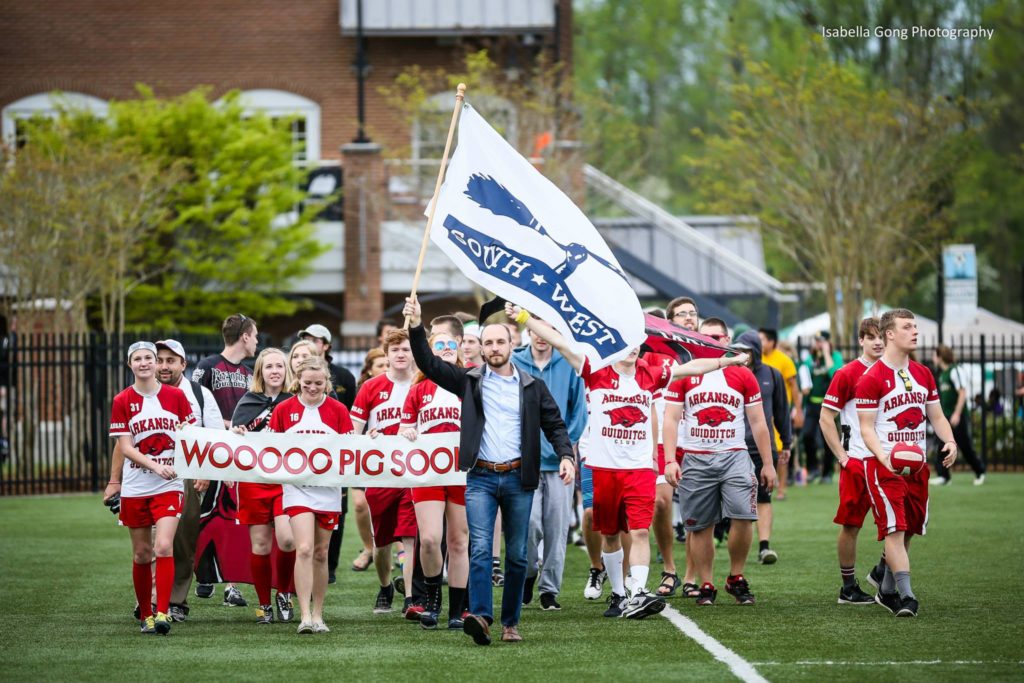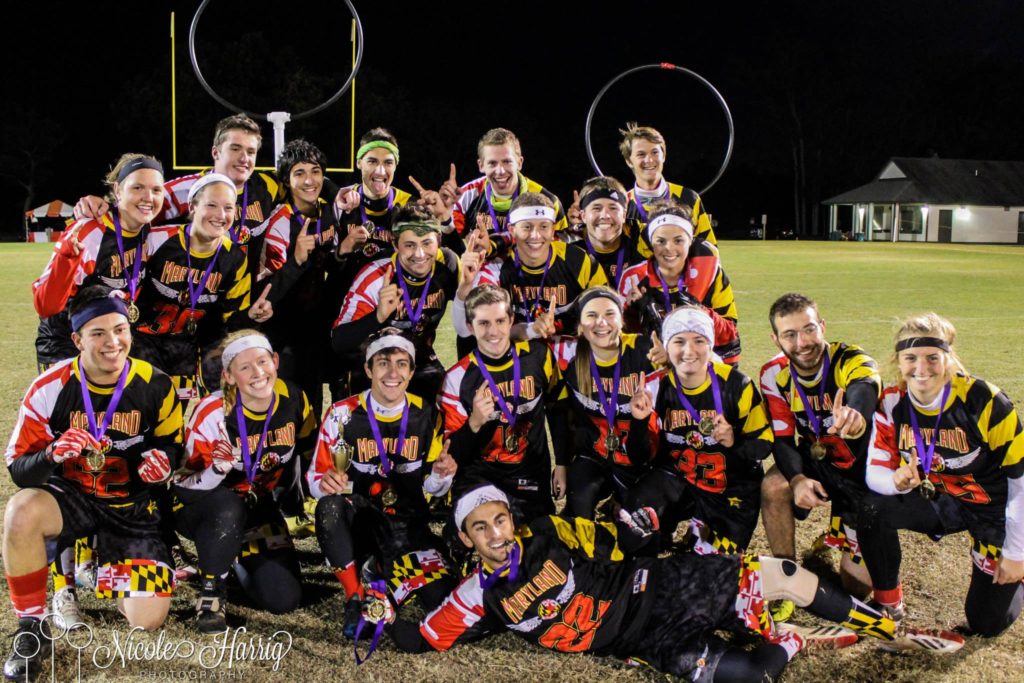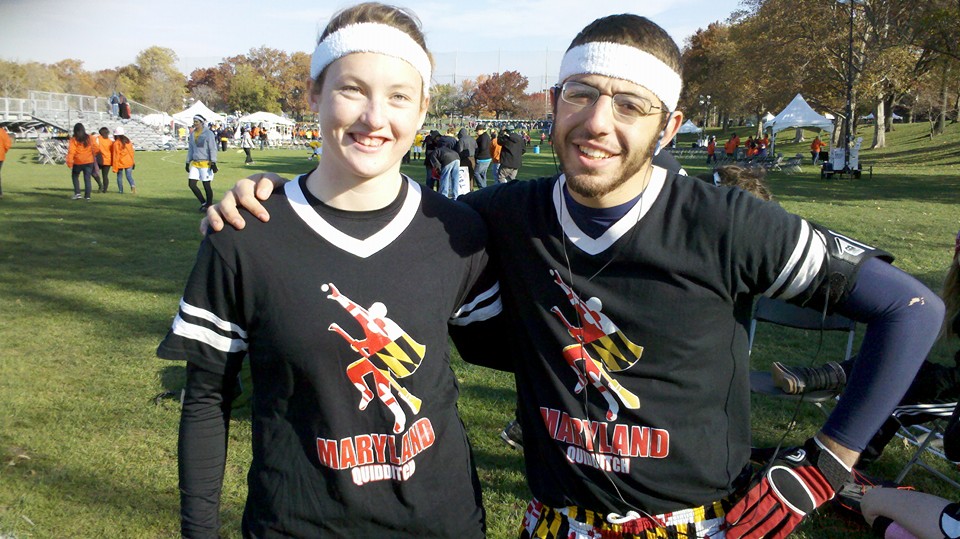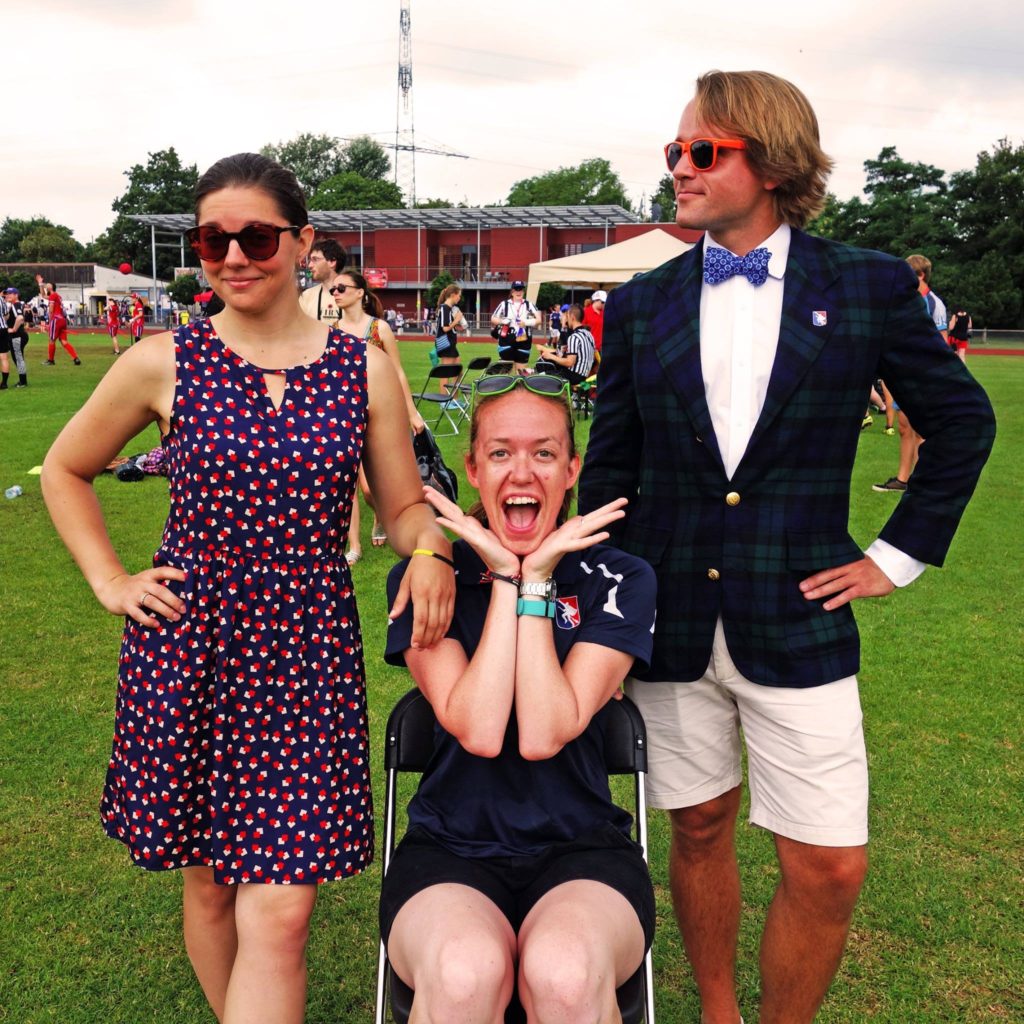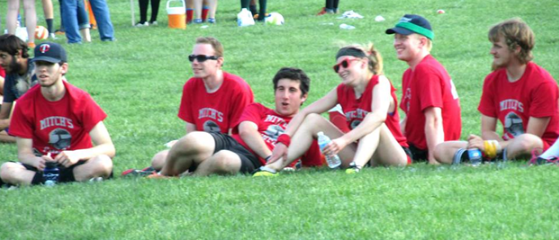Antwerp QC, Much of Belgian Core, Leaves Competitive Quidditch
Great college programs have risen and fallen throughout our bracket. But it should come as no surprise that our final matchup is a reprise of World Cup VII’s University of Texas v. University of Maryland. Will the results be the same? Or will the Terrapins deny the Longhorns the mantle of the Best College Program of the modern era?
Guest writers Raghuveer Achukola and Erin Mallory gives their thoughts on why their team of choice is the only one worthy of your vote.
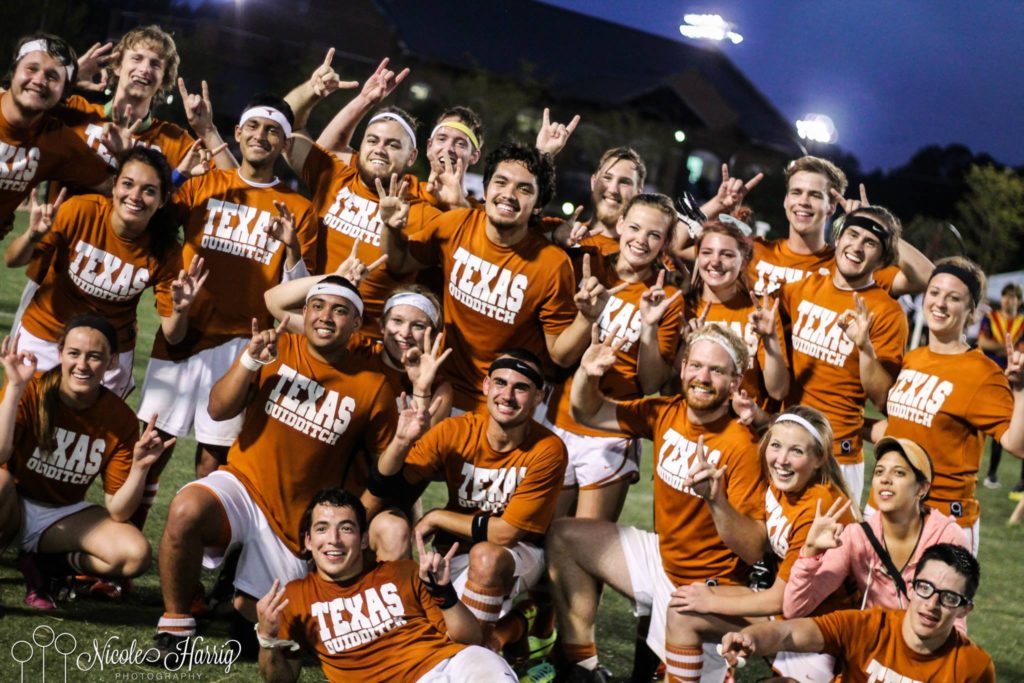
Credit: Nicole Harrig
University of Texas
By Raghuveer Achukola
The University of Texas has been the most important college program in the modern era. There is not a single team that can compare to the impact of this team on the field. While other elite teams like the University Maryland or Emerson College might be able to claim two or three Team USA players, Texas has sent a whopping 10 players to Team USA and has been in contention for the best college team in quidditch every single year of their existence.
Moreover, Texas alumni have transformed the nature of quidditch in the Southwest. Arguably the best community team program in modern quidditch, Lone Star Quidditch Club was founded in-part by Texas alumni Kody Marshall and Chris Morris. To say Lone Star has not had a profound impact in quidditch would be a boldfaced lie. Lone Star is a giant of a community team program that has won the Southwest Regional Championship for three years in a row and has consistently performed incredibly at nationals.
Lone Star as a program is not even the only successful quidditch contribution that Longhorn alumni have made. Both Jacob Adlis and Hank Dugie have been key members of the US Quidditch Board of Directors, as well as important contributors off-field to developing this sport. Moreover, Dugie has played an important role in MLQ, as both the coach and general manager of the League City Legends and playing a key role in preparing League City’s bid for its second MLQ Championship. Adlis, on the other hand, along with alumni Marshall and Sarah Holub (who also coached the 2014 Team USA), created “The Pitch”, quidditch’s first true analysis project which ran through the World Cup V and VI seasons and was important in elevating the level of quidditch analysis in the community.
None of this even covers the contributions of alumnus Augustine Monroe, who not only created another incredibly strong community team in Texas Cavalry with Texas alumnus Marty Bermudez, but is also instrumental in the Southwest as a certified head referee. Monroe has refereed countless games both during his tenure at Cavalry and while wearing the burnt orange of his alma mater. He also played a key part in supporting the start of MLQ by traveling cross-country to play for the New York Titans in MLQ’s inaugural season.
Some important volunteers in the Southwest are Texas graduates who never even played quidditch for the varsity team. Max Parks and Nick Engmann have been instrumental as the Snitch Development Coordinator and an elite snitch in the region, respectively, for the last four years. Both deserve a ton of credit for elevating the level of snitching in the Southwest and worldwide.
None of the great contributions by alumni can overshadow the fact that Texas’s current players are game-changers as well. Chaser Nick Marino and beaters Hallie Pace and Eddie Molina are all potential Team USA picks for 2018. As a program, Texas is not solely coasting off the contributions of its alumni. They have been a relevant force in the Southwest by continually developing great quidditch players. Texas Quidditch has 12 alumni on top community teams, a number that is, without a doubt, in contention for the highest out of any college. In addition to three national titles, Texas has contributed more than twice the Team USA players than their closest competitors, two members of USQ’s board of directors, numerous volunteers for the IQA, as well as multiple referees and two elite community teams. Quidditch, as we know it, would not be the same if it wasn’t for the most important college program of the modern era… Texas Quidditch.
University of Maryland
By Erin Mallory
The University of Maryland is a quidditch program that is unrivaled in the growth of the sport. But I’m not going to convince you with fancy words and eloquent text. No. I’m just going to list everything we’ve done. Our accomplishments and effort alone have caused quidditch to become what it is today.
Sarah Woolsey
- 2011: IQA Gameplay Coordinator
- 2012-13: IQA-Certified Head Referee
- World Cup VII Tournament Director
- World Cup 8 Tournament Director
- US Quidditch Cup 9 Tournament Director
- 2013-16: IQA/USQ Events Manager
- 2016-present: USQ Executive Director
Erin Mallory
- 2012-13: IQA Scores Reporter
- 2013-14: USQ Editorial Correspondent
- 2014-17: USQ-Certified Head Referee
- 2015-17: USQ Mid-Atlantic Regional Coordinator
- 2015-16: USQ Referee of the Year
- 2016 World Cup US Referee Representative
- 2016 World Cup Finals Head Referee
- 2016-17: USQ Events Volunteer
- 2015-17: USQ Field Test Proctor
Ricky Nelson
- 2011-present USQ-Certified Head Referee
- 2017 Referee of the Month and Referee of the Year Runner-Up
- 2012-present: USQ-Certified Snitch Runner
- 2014-present: USQ Field Test Proctor
- 2014-15: Referee Advancement Coordinator
- 2013-14 Contributing Writer for USQ
- 2014-present: The Eighth Man Correspondent
- 2015-present: MLQ East Division Referee Lead
- 2015-present: Member of MLQ Rules Team
Logan Anbinder
- 2011-12: IQA Convention Representative
- 2011-12: IQA South Regional Director
- 2011-12: IQA Maryland/District of Columbia State Representative
- 2012-13: IQA Mid-Atlantic Regional Director
- 2012-2014: IQA Marketing Director, IQA Management Team
- 2014-present: USQ Tournament Director Certification Coordinator
- Pushed to create the Mid-Atlantic region in 2012
- Volunteer at World Cup VI, VII, 8, US Quidditch Cup 9 and 10
Harry Greenhouse
- 2012-present: Snitch
- 2014: Team USA Player
- 2015-17: MLQ Boston Night Riders Coach
- 2015: MLQ Benepe Cup Champion
- 2016: US Quidditch Cup 9 Champion
- 2016: Team USA Player
- 2016: MLQ Benepe Cup Champion
James Hicks
- 2012: Team USA Player
- 2012-14: IQA State Representative, Maryland
- 2016: Team USA Coach
- 2014-16: District of Columbia Quidditch Club Coach
- 2015-16: MLQ Washington Admirals Manager
And those are just the big names. Many other members of Maryland have contributed behind the scenes in ways many people don’t know about. Emily Williams was a major volunteer coordinator and contributor to the event staff of World Cup VI while she was playing. Caroline Pitt was a USQ State Representative. Sam Medney was a consistent USQ photographer and her mother, Tania Medney, was on the USQ World Cup Hospitality team for many years. Our players’ volunteer hours alone have made USQ what it is today.
Now that’s just the off-field accomplishments. On field, we don’t have the three national titles that the University of Texas has, but we do bring a consistent level of play and a winning history to compete with them:
- Three-time Mid-Atlantic Regional Champion
- One-time Regional Runner-Up
- 16 tournament wins since spring 2012
- Hicks and Greenhouse were both two-time members of Team USA
- Mallory, Patrick Rardin and Zac Connelly were Team USA alternates
- World Cup/US Quidditch Cup bracket appearances every year since World Cup V:
- World Cup V: Round of 32
- World Cup VI: Sweet 16
- World Cup VII: Sweet 16
- World Cup 8: Final Four
- US Quidditch Cup 9: Round of 32
- Hosts annual fall tournament featuring teams from the Northeast and Mid-Atlantic regions
- Four-time winner of Better than World Cup award, which had its name changed when a Maryland alumna started running World Cup
- Nelson, Mallory, Marks, Brenden Hutton, Woolsey, Hicks, Medney and Garrett Sadtler have all served as key referees through Maryland’s existence
- Home to a USQ Referee of the Year and a USQ Referee of the Year Runner Up
Texas is a great program and if this was an on-field contest, I’d give them the nod. But, overall, when you combine the amount of people who have come from Maryland and dedicated their time and effort to better this sport with the consistent level of play that we have always shown, there is no comparison.
Plus, Maryland gave y’all Natty Boh Brawl, which gave us Mitch Cavender’s Finest.
Voting closes on Saturday, April 1 at 11:59 pm ET for the Best College Program of the modern era. Cast your vote here.
Archives by Month:
- May 2023
- April 2023
- April 2022
- January 2021
- October 2020
- September 2020
- July 2020
- May 2020
- April 2020
- March 2020
- February 2020
- January 2020
- December 2019
- November 2019
- October 2019
- August 2019
- April 2019
- March 2019
- February 2019
- January 2019
- November 2018
- October 2018
- September 2018
- August 2018
- July 2018
- June 2018
- April 2018
- March 2018
- February 2018
- January 2018
- November 2017
- October 2017
- July 2017
- June 2017
- May 2017
- April 2017
- March 2017
- February 2017
- January 2017
- December 2016
- November 2016
- October 2016
- September 2016
- August 2016
- July 2016
- June 2016
- May 2016
- April 2016
- March 2016
- February 2016
- January 2016
- December 2015
- November 2015
- October 2015
- September 2015
- August 2015
- July 2015
- June 2015
- May 2015
- April 2015
- March 2015
- February 2015
- January 2015
- December 2014
- November 2014
- October 2014
- September 2014
- August 2014
- July 2014
- May 2014
- April 2014
- March 2014
- February 2014
- January 2014
- November 2013
- October 2013
- September 2013
- August 2013
- July 2013
- June 2013
- May 2013
- April 2013
- March 2013
- February 2013
- January 2013
- December 2012
- November 2012
- October 2012
Archives by Subject:
- Categories
- Awards
- College/Community Split
- Column
- Community Teams
- Countdown to Columbia
- DIY
- Drills
- Elo Rankings
- Fantasy Fantasy Tournaments
- Game & Tournament Reports
- General
- History Of
- International
- IQA World Cup
- Major League Quidditch
- March Madness
- Matches of the Decade
- Monday Water Cooler
- News
- Positional Strategy
- Press Release
- Profiles
- Quidditch Australia
- Rankings Wrap-Up
- Referees
- Rock Hill Roll Call
- Rules and Policy
- Statistic
- Strategy
- Team Management
- Team USA
- The Pitch
- The Quidditch Lens
- Top 10 College
- Top 10 Community
- Top 20
- Uncategorized
- US Quarantine Cup
- US Quidditch Cup

